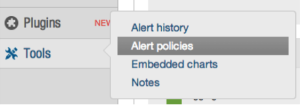

New Relic, a popular application performance management solution PagerDuty integrates with, is holding their first user conference, FutureStack, today and tomorrow. At FutureStack, New Relic will be launching new mobile and social analytics and app monitoring features. Here at PagerDuty, the feature we are most excited about is Alert Policies because it will improve alert notifications for New Relic and PagerDuty customers.
New Relic’s new Alert Policies allows customers to quickly and easily set alert thresholds, share common alert conditions across servers, applications, or key transactions and notify the right person or group of people when something goes wrong. New Relic offers monitoring for many types of systems, so getting the right alerts sent to the right person is tricky. For example, your server team doesn’t need to receive your web team’s alerts. New Relic customers can now optimize their alerts to remove the noise and tune into what is important and relevant to them.
Configure Notification Channels for Alert Policies

Within Notification Channels, New Relic customers can create notification groups (Server Team) and assign policies that are relevant to them (CPU 90%). Also within Notification Channels, New Relic customers can choose PagerDuty as an alert channel for these notification groups. To set-up PagerDuty as an alert channel, please refer to this New Relic and PagerDuty integration guide.
What This Means for New Relic and PagerDuty Customers
We are excited about Alert Policies because it makes it easier for users to set alert thresholds and groups within New Relic. When these thresholds are crossed, incidents will be created in PagerDuty. With PagerDuty’s customizable on-call scheduling and escalation policies, the right people will be contacted using the alerting combination (phone call, text, mobile push notification, and email) of their choice. We’d like to hear from New Relic and PagerDuty customers on their thoughts around Alert Policies!